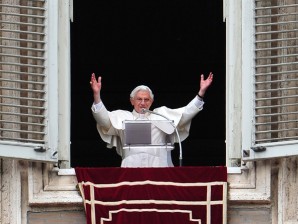VATICAN CITY — Pope Benedict XVI has prayed for the strength to carry on as he marks two major milestones this week: his 85th birthday and the seventh anniversary of his election to the papacy.

Pope Benedict XVI leads the Regina Coeli prayer from a window of his appartments on April 15, 2012 with faithful gathered at St Peter's square at The Vatican. Pope Benedict XVI will turn 85 on April 16. AFP PHOTO / ALBERTO PIZZOLI
His comments Sunday, while innocuous, were the clearest sign yet that Benedict has no intention of resigning anytime soon despite his age and increasing frailty.
“Next Thursday, on the occasion of the seventh anniversary of my election to the See of Peter, I ask for your prayers, so that the Lord gives me the strength to fulfill the mission he entrusted to me,” he said in French to thousands of people in St. Peter’s Square.
Benedict has slowed down recently — he was seen in public for the first time using a cane when he boarded his plane for Mexico last month. During the long, six-day trip to Mexico and Cuba, he at times looked exhausted. He looked similarly tired during the busy Holy Week services that greeted him upon his return to Rome.
But Benedict’s health is remarkably strong for someone his age. He has never canceled a planned event due to illness and suffers from no known chronic illnesses. Few men his age go to work every day, run a 1-billion strong church, write books, deliver speeches and meet with visiting heads of state.
And Benedict has some very pressing issues on his agenda. The Vatican is expected to receive word soon from a breakaway group of traditionalist Catholics on whether they will accept the Holy See’s terms for reconciliation.
The group, the Society of St. Pius X, opposes some of the core teachings of the Second Vatican Council, particularly its outreach to Jews. Benedict, who is not unsympathetic to some of their concerns, has worked since the start of his pontificate to try to bring them back under Rome’s wing out of fear that they are essentially creating a parallel church.
On the other side of the spectrum are hundreds of dissident priests who are making their voices heard in Europe: Priest movements in Austria and Ireland are calling for a relaxation of the celibacy requirement for priests and for the church to ordain women — two things the Vatican has ruled out.
Benedict appeared so concerned by the Austrian initiative in particular that he dedicated much of his Holy Thursday homily to reminding its members that he had no authority whatsoever to allow women priests since an all-male priesthood was an “irrevocable” church teaching.
Other big events on the pope’s agenda include a trip to Lebanon in September, a meeting of the world’s bishops in Rome the following month, and farther ahead, World Youth Day in Rio de Janeiro in the summer of 2013.
While he was in Cuba last month meeting with Fidel Castro, Benedict was asked by the 85-year-old retired Cuban president how he can manage to keep doing his job. Castro noted that at his age, he spends his time reading and reflecting.
“I am old but I still manage to carry out my duty,” Benedict told him, according to a Vatican spokesman.
That said, Benedict has greatly cut back his schedule. And his birthday Monday will be a rather small-scale affair: His older brother Monsignor Georg Ratzinger flew in from Germany over the weekend, and Benedict will meet with the governor of his native Bavaria and some Bavarian bishops in town who want to wish him well.
Benedict himself asked to keep the birthday celebrations low-key, his secretary Monsignor Georg Gaenswein told Italian weekly Gente. “Just a family party. As he requested: ‘Please I don’t want any big celebrations,'” Gaenswein quoted the pope as telling his aides.
Popes are allowed to resign; church law specifies only that the resignation be “freely made and properly manifested.” Only a handful have done so, however. The last one was Pope Gregory XII, who stepped down in 1415 in a deal to end the Great Western Schism among competing papal claimants.
Benedict himself raised the possibility of resigning if he were simply too old or sick to continue when he was interviewed for the book “Light of the World,” which was released in November 2010.
“If a pope clearly realizes that he is no longer physically, psychologically and spiritually capable of handling the duties of his office, then he has a right, and under some circumstances, also an obligation to resign,” Benedict said.
The former Cardinal Joseph Ratzinger also had an intimate view of Pope John Paul II’s suffering through the debilitating end of his papacy.
Benedict is now older than John Paul when he died. He was also the oldest pope in 300 years when he was elected at age 78 in 2005, and will soon be one of only a handful of popes over the past half-millennia to reign past age 85.
But if his requests for prayers to carry on his mission are any indication, a resignation is unlikely any time soon.